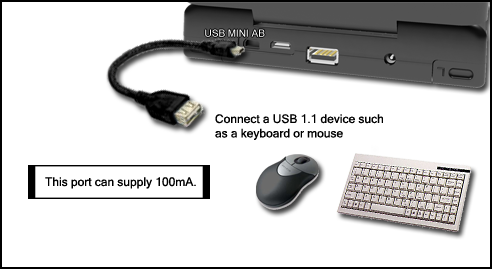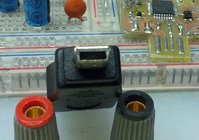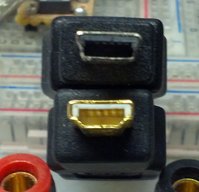#1 — rebooted with usb service on
lsusb: Bus 001 Device 001: ID 1d6b:0002 Linux Foundation 2.0 root hub
dmesg:
[ 0.000000] Linux version 3.2.39 (notaz@pixelinis) (gcc version 4.5.2 (Sourcery G++ Lite 2011.03-41) ) #872 Sat Mar 23 02:56:41 EET 2013
[ 0.000000] CPU: ARMv7 Processor [411fc083] revision 3 (ARMv7), cr=10c5387d
[ 0.000000] CPU: PIPT / VIPT nonaliasing data cache, VIPT nonaliasing instruction cache
[ 0.000000] Machine: Pandora Handheld Console
[ 0.000000] Initialized persistent memory from 80fe0000-80ffffff
[ 0.000000] cma: CMA: reserved 16 MiB at 9f000000
[ 0.000000] Memory policy: ECC disabled, Data cache writeback
[ 0.000000] On node 0 totalpages: 131072
[ 0.000000] free_area_init_node: node 0, pgdat c05b236c, node_mem_map c05e4000
[ 0.000000] Normal zone: 1024 pages used for memmap
[ 0.000000] Normal zone: 0 pages reserved
[ 0.000000] Normal zone: 130048 pages, LIFO batch:31
[ 0.000000] OMAP3430/3530 ES3.1 (l2cache iva sgx neon isp )
[ 0.000000] Clocking rate (Crystal/Core/MPU): 26.0/332/500 MHz
[ 0.000000] pcpu-alloc: s0 r0 d32768 u32768 alloc=1*32768
[ 0.000000] pcpu-alloc: [0] 0
[ 0.000000] Built 1 zonelists in Zone order, mobility grouping on. Total pages: 130048
[ 0.000000] Kernel command line: ubi.mtd=4 ubi.mtd=3 root=ubi0:rootfs rootfstype=ubifs rw rootflags=bulk_read vram=6272K omapfb.vram=0:3000K mmc_core.removable=0 quiet
[ 0.000000] PID hash table entries: 2048 (order: 1, 8192 bytes)
[ 0.000000] Dentry cache hash table entries: 65536 (order: 6, 262144 bytes)
[ 0.000000] Inode-cache hash table entries: 32768 (order: 5, 131072 bytes)
[ 0.000000] Memory: 512MB = 512MB total
[ 0.000000] Memory: 497180k/497180k available, 27108k reserved, 0K highmem
[ 0.000000] Virtual kernel memory layout:
[ 0.000000] vector : 0xffff0000 - 0xffff1000 ( 4 kB)
[ 0.000000] fixmap : 0xfff00000 - 0xfffe0000 ( 896 kB)
[ 0.000000] vmalloc : 0xe0800000 - 0xf8000000 ( 376 MB)
[ 0.000000] lowmem : 0xc0000000 - 0xe0000000 ( 512 MB)
[ 0.000000] modules : 0xbf000000 - 0xc0000000 ( 16 MB)
[ 0.000000] .text : 0xc0008000 - 0xc05436dc (5358 kB)
[ 0.000000] .init : 0xc0544000 - 0xc0576000 ( 200 kB)
[ 0.000000] .data : 0xc0576000 - 0xc05b2ac0 ( 243 kB)
[ 0.000000] .bss : 0xc05b2ae4 - 0xc05e3ce0 ( 197 kB)
[ 0.000000] SLUB: Genslabs=11, HWalign=64, Order=0-3, MinObjects=0, CPUs=1, Nodes=1
[ 0.000000] NR_IRQS:410
[ 0.000000] IRQ: Found an INTC at 0xfa200000 (revision 4.0) with 96 interrupts
[ 0.000000] Total of 96 interrupts on 1 active controller
[ 0.000000] OMAP clockevent source: GPTIMER1 at 32768 Hz
[ 0.000000] sched_clock: 32 bits at 32kHz, resolution 30517ns, wraps every 131071999ms
[ 0.000000] Console: colour dummy device 80x30
[ 0.000000] console [tty0] enabled
[ 0.000244] Calibrating delay loop... 497.82 BogoMIPS (lpj=1941504)
[ 0.039093] pid_max: default: 32768 minimum: 301
[ 0.039428] Mount-cache hash table entries: 512
[ 0.039916] Initializing cgroup subsys devices
[ 0.040008] CPU: Testing write buffer coherency: ok
[ 0.040283] hw perfevents: enabled with ARMv7 Cortex-A8 PMU driver, 5 counters available
[ 0.040435] Setting up static identity map for 0x803e61f0 - 0x803e6248
[ 0.041320] devtmpfs: initialized
[ 0.059356] print_constraints: dummy:
[ 0.061004] NET: Registered protocol family 16
[ 0.064025] DMA: preallocated 256 KiB pool for atomic coherent allocations
[ 0.064483] GPMC revision 5.0
[ 0.068664] OMAP GPIO hardware version 2.5
[ 0.073211] omap_mux_init: Add partition: #1: core, flags: 0
[ 0.081542] Reprogramming SDRC clock to 332000000 Hz
[ 0.084442] hw-breakpoint: debug architecture 0x4 unsupported.
[ 0.093902] omap-mcbsp.2: alias fck already exists
[ 0.094299] omap-mcbsp.3: alias fck already exists
[ 0.096191] OMAP DMA hardware revision 4.0
[ 0.117340] bio: create slab <bio-0> at 0
[ 0.118865] print_constraints: vwlan: 1800 mV
[ 0.120910] SCSI subsystem initialized
[ 0.124053] usbcore: registered new interface driver usbfs
[ 0.124359] usbcore: registered new interface driver hub
[ 0.124694] usbcore: registered new device driver usb
[ 0.140747] omap_i2c omap_i2c.1: bus 1 rev1.3.12 at 2600 kHz
[ 0.144592] twl4030: PIH (irq 7) chaining IRQs 368..375
[ 0.144714] twl4030: power (irq 373) chaining IRQs 376..383
[ 0.145416] twl4030: gpio (irq 368) chaining IRQs 384..401
[ 0.145996] _omap_mux_init_gpio: Could not set gpio192
[ 0.147399] _omap_mux_init_gpio: Could not set gpio193
[ 0.150817] print_constraints: VUSB1V5: 1500 mV normal standby
[ 0.151672] print_constraints: VUSB1V8: 1800 mV normal standby
[ 0.152526] print_constraints: VUSB3V1: 3100 mV normal standby
[ 0.211029] twl4030_usb twl4030_usb: Initialized TWL4030 USB module
[ 0.212829] print_constraints: vdd_mpu_iva: 600 <--> 1450 mV normal
[ 0.213653] print_constraints: vdd_core: 600 <--> 1450 mV normal
[ 0.214569] print_constraints: VMMC1: 1850 <--> 3150 mV at 3150 mV normal standby
[ 0.215484] print_constraints: VDAC: 1800 mV normal standby
[ 0.216369] print_constraints: VAUX2: 1800 mV normal standby
[ 0.217254] print_constraints: VPLL2: 1800 mV normal standby
[ 0.218170] print_constraints: VMMC2: 1850 <--> 3150 mV at 3150 mV normal standby
[ 0.219116] print_constraints: VSIM: 2800 mV normal standby
[ 0.219940] print_constraints: VAUX1: 3000 mV normal standby
[ 0.220764] print_constraints: VAUX4: 3000 mV normal standby
[ 0.234497] omap_i2c omap_i2c.3: bus 3 rev1.3.12 at 100 kHz
[ 0.237457] omap-iommu omap-iommu.0: isp registered
[ 0.238281] Advanced Linux Sound Architecture Driver Version 1.0.24.
[ 0.239318] Switching to clocksource 32k_counter
[ 0.269134] musb-hdrc: version 6.0, ?dma?, otg (peripheral+host)
[ 0.274932] musb-hdrc: ConfigData=0xde (UTMI-8, dyn FIFOs, bulk combine, bulk split, HB-ISO Rx, HB-ISO Tx, SoftConn)
[ 0.274963] musb-hdrc: MHDRC RTL version 1.400
[ 0.274963] musb-hdrc: setup fifo_mode 4
[ 0.274993] musb-hdrc: 28/31 max ep, 16384/16384 memory
[ 0.275634] musb-hdrc musb-hdrc: USB OTG mode controller at fa0ab000 using DMA, IRQ 92
[ 0.276763] NET: Registered protocol family 2
[ 0.276977] IP route cache hash table entries: 4096 (order: 2, 16384 bytes)
[ 0.277404] TCP established hash table entries: 16384 (order: 5, 131072 bytes)
[ 0.277832] TCP bind hash table entries: 16384 (order: 4, 65536 bytes)
[ 0.278076] TCP: Hash tables configured (established 16384 bind 16384)
[ 0.278106] TCP reno registered
[ 0.278137] UDP hash table entries: 256 (order: 0, 4096 bytes)
[ 0.278167] UDP-Lite hash table entries: 256 (order: 0, 4096 bytes)
[ 0.278472] NET: Registered protocol family 1
[ 0.278991] NetWinder Floating Point Emulator V0.97 (double precision)
[ 0.285949] HugeTLB registered 2 MB page size, pre-allocated 0 pages
[ 0.306365] VFS: Disk quotas dquot_6.5.2
[ 0.306915] Dquot-cache hash table entries: 1024 (order 0, 4096 bytes)
[ 0.313201] msgmni has been set to 1003
[ 0.315704] Block layer SCSI generic (bsg) driver version 0.4 loaded (major 253)
[ 0.315704] io scheduler noop registered
[ 0.315734] io scheduler deadline registered
[ 0.315795] io scheduler cfq registered (default)
[ 0.331207] OMAP DSS rev 2.0
[ 0.335571] Serial: 8250/16550 driver, 4 ports, IRQ sharing enabled
[ 0.338287] omap_uart.0: ttyO0 at MMIO 0x4806a000 (irq = 72) is a OMAP UART0
[ 0.338867] omap_uart.1: ttyO1 at MMIO 0x4806c000 (irq = 73) is a OMAP UART1
[ 0.339385] omap_uart.2: ttyO2 at MMIO 0x49020000 (irq = 74) is a OMAP UART2
[ 0.354949] brd: module loaded
[ 0.362701] loop: module loaded
[ 0.362792] OMAP overclocker loaded.
[ 0.365692] omap2-nand driver initializing
[ 0.365875] NAND device: Manufacturer ID: 0x2c, Chip ID: 0xbc (Micron NAND 512MiB 1,8V 16-bit)
[ 0.366424] Creating 5 MTD partitions on "omap2-nand.0":
[ 0.366485] 0x000000000000-0x000000080000 : "xloader"
[ 0.367462] 0x000000080000-0x000000260000 : "uboot"
[ 0.368591] 0x000000260000-0x000000280000 : "uboot-env"
[ 0.369384] 0x000000280000-0x000000c80000 : "boot"
[ 0.371948] 0x000000c80000-0x000020000000 : "rootfs"
[ 0.462463] UBI: attaching mtd4 to ubi0
[ 1.560577] UBI: scanning is finished
[ 1.578094] UBI: attached mtd4 (name "rootfs", size 499 MiB) to ubi0
[ 1.578125] UBI: PEB size: 131072 bytes (128 KiB), LEB size: 129024 bytes
[ 1.578155] UBI: min./max. I/O unit sizes: 2048/2048, sub-page size 512
[ 1.578155] UBI: VID header offset: 512 (aligned 512), data offset: 2048
[ 1.578186] UBI: good PEBs: 3996, bad PEBs: 0, corrupted PEBs: 0
[ 1.578186] UBI: user volume: 1, internal volumes: 1, max. volumes count: 128
[ 1.578216] UBI: max/mean erase counter: 33/7, WL threshold: 4096, image sequence number: 1067625662
[ 1.578247] UBI: available PEBs: 0, total reserved PEBs: 3996, PEBs reserved for bad PEB handling: 39
[ 1.578277] UBI: attaching mtd3 to ubi1
[ 1.578765] UBI: background thread "ubi_bgt0d" started, PID 569
[ 1.601104] UBI: scanning is finished
[ 1.609741] UBI: attached mtd3 (name "boot", size 10 MiB) to ubi1
[ 1.609741] UBI: PEB size: 131072 bytes (128 KiB), LEB size: 129024 bytes
[ 1.609771] UBI: min./max. I/O unit sizes: 2048/2048, sub-page size 512
[ 1.609802] UBI: VID header offset: 512 (aligned 512), data offset: 2048
[ 1.609802] UBI: good PEBs: 80, bad PEBs: 0, corrupted PEBs: 0
[ 1.609832] UBI: user volume: 1, internal volumes: 1, max. volumes count: 128
[ 1.609832] UBI: max/mean erase counter: 10/3, WL threshold: 4096, image sequence number: 1344244902
[ 1.609863] UBI: available PEBs: 0, total reserved PEBs: 80, PEBs reserved for bad PEB handling: 2
[ 1.610107] UBI: background thread "ubi_bgt1d" started, PID 574
[ 1.610229] usbcore: registered new interface driver libusual
[ 1.611053] mousedev: PS/2 mouse device common for all mice
[ 1.611785] input: keypad as /devices/platform/omap_i2c.1/i2c-1/1-004a/twl4030_keypad/input/input0
[ 1.615722] input: power-button as /devices/platform/omap_i2c.1/i2c-1/1-0049/twl4030_pwrbutton/input/input1
[ 1.617340] input: nub0 as /devices/platform/omap_i2c.3/i2c-3/3-0066/input/input2
[ 1.619049] input: nub1 as /devices/platform/omap_i2c.3/i2c-3/3-0067/input/input3
[ 1.625579] twl_rtc twl_rtc: rtc core: registered twl_rtc as rtc0
[ 1.626586] i2c /dev entries driver
[ 1.631408] bq27x00-battery 3-0055: support ver. 1.2.0 enabled
[ 1.655487] OMAP Watchdog Timer Rev 0x31: initial timeout 60 sec
[ 1.655975] twl4030_wdt twl4030_wdt: Failed to register misc device
[ 1.656036] twl4030_wdt: probe of twl4030_wdt failed with error -16
[ 1.656646] voltdm_scale: No voltage scale API registered for vdd_mpu_iva
[ 1.656707] platform mpu.0: omap_target: unable to scale voltage up.
[ 1.657135] cpuidle: using governor ladder
[ 1.657135] cpuidle: using governor menu
[ 1.884338] Registered led device: pandora::sd1
[ 1.884643] Registered led device: pandora::sd2
[ 1.884887] Registered led device: pandora::bluetooth
[ 1.885192] Registered led device: pandora::wifi
[ 1.886474] Registered led device: pandora::keypad_bl
[ 1.887573] Registered led device: pandora:

ower
[ 1.905944] Registered led device: pandora::charger
[ 1.907409] usbcore: registered new interface driver usbhid
[ 1.907409] usbhid: USB HID core driver
[ 1.907592] persistent_ram: found existing buffer, size 981, start 981
[ 1.912170] console [ram-1] enabled
[ 1.914886] OMAP3 Pandora SoC init
[ 1.996704] asoc: twl4030-hifi <-> omap-mcbsp-dai.1 mapping ok
[ 1.999145] asoc: twl4030-hifi <-> omap-mcbsp-dai.3 mapping ok
[ 2.001831] ALSA device list:
[ 2.001861] #0: omap3pandora
[ 2.002044] TCP cubic registered
[ 2.002044] NET: Registered protocol family 17
[ 2.002136] NET: Registered protocol family 15
[ 2.002136] Registering the dns_resolver key type
[ 2.002227] VFP support v0.3: implementor 41 architecture 3 part 30 variant c rev 1
[ 2.002227] ThumbEE CPU extension supported.
[ 2.002288] Registering SWP/SWPB emulation handler
[ 2.009857] clock: disabling unused clocks to save power
[ 2.011230] registered taskstats version 1
[ 2.035095] Console: switching to colour frame buffer device 100x30
[ 2.218811] regulator_init_complete: VAUX2: incomplete constraints, leaving on
[ 2.222778] input: gpio-keys as /devices/platform/gpio-keys/input/input4
[ 2.224853] twl_rtc twl_rtc: setting system clock to 2013-05-08 21:44:13 UTC (1368049453)
[ 2.226989] UBIFS: background thread "ubifs_bgt0_0" started, PID 670
[ 2.231994] mmc0: host does not support reading read-only switch. assuming write-enable.
[ 2.233795] mmc0: new high speed SDHC card at address 0001
[ 2.234802] mmcblk0: mmc0:0001 00000 7.46 GiB
[ 2.237243] mmcblk0: p1 p2 p3
[ 2.314147] UBIFS: mounted UBI device 0, volume 0, name "rootfs"(null)
[ 2.314178] UBIFS: LEB size: 129024 bytes (126 KiB), min./max. I/O unit sizes: 2048 bytes/2048 bytes
[ 2.314208] UBIFS: FS size: 508612608 bytes (485 MiB, 3942 LEBs), journal size 9033728 bytes (8 MiB, 71 LEBs)
[ 2.314208] UBIFS: reserved for root: 0 bytes (0 KiB)
[ 2.314239] UBIFS: media format: w4/r0 (latest is w4/r0), UUID 3234489E-AD5D-47B1-9185-67A86C6B3788, small LPT model
[ 2.315124] VFS: Mounted root (ubifs filesystem) on device 0:14.
[ 2.316040] devtmpfs: mounted
[ 2.316558] Freeing init memory: 200K
[ 2.516754] mmc1: host does not support reading read-only switch. assuming write-enable.
[ 2.518737] mmc1: new high speed SDHC card at address b368
[ 2.521148] mmcblk1: mmc1:b368 H2555 14.9 GiB
[ 2.524139] mmcblk1: p1
[ 2.628356] mmc2: card claims to support voltages below the defined range. These will be ignored.
[ 2.629547] mmc2: new SDIO card at address 0001
[ 3.290100] udevd (729): /proc/729/oom_adj is deprecated, please use /proc/729/oom_score_adj instead.
[ 30.677764] ads7846 spi1.0: touchscreen, irq 254
[ 30.678741] input: touchscreen as /devices/platform/omap2_mcspi.1/spi_master/spi1/spi1.0/input/input5
[ 39.205902] FAT-fs (mmcblk1): bogus number of reserved sectors
[ 39.206054] FAT-fs (mmcblk1): Can't find a valid FAT filesystem
[ 39.299194] FAT-fs (mmcblk0): invalid media value (0x00)
[ 39.299468] FAT-fs (mmcblk0): Can't find a valid FAT filesystem
[ 40.833923] FAT-fs (mmcblk1): bogus number of reserved sectors
[ 40.834075] FAT-fs (mmcblk1): Can't find a valid FAT filesystem
[ 40.856872] FAT-fs (mmcblk0): invalid media value (0x00)
[ 40.857116] FAT-fs (mmcblk0): Can't find a valid FAT filesystem
[ 41.886352] EXT3-fs (mmcblk0p2): error: unrecognized mount option "umask=0" or missing value
[ 41.993011] kjournald starting. Commit interval 5 seconds
[ 41.993072] EXT3-fs (mmcblk0p2): warning: maximal mount count reached, running e2fsck is recommended
[ 42.012054] EXT3-fs (mmcblk0p2): using internal journal
[ 42.012084] EXT3-fs (mmcblk0p2): mounted filesystem with ordered data mode
[ 42.111541] alignment: ignoring faults is unsafe on this CPU. Defaulting to fixup mode.
[ 42.393341] fuse init (API version 7.17)
[ 42.523773] NET: Registered protocol family 10
[ 42.694458] zram: module is from the staging directory, the quality is unknown, you have been warned.
[ 42.696838] zram: num_devices not specified. Using default: 1
[ 42.696868] zram: Creating 1 devices ...
[ 42.888427] UBIFS: background thread "ubifs_bgt1_0" started, PID 1671
[ 42.986694] UBIFS: mounted UBI device 1, volume 0, name "boot"(null)
[ 42.986724] UBIFS: LEB size: 129024 bytes (126 KiB), min./max. I/O unit sizes: 2048 bytes/2048 bytes
[ 42.986724] UBIFS: FS size: 8386560 bytes (7 MiB, 65 LEBs), journal size 1032193 bytes (0 MiB, 6 LEBs)
[ 42.986755] UBIFS: reserved for root: 396117 bytes (386 KiB)
[ 42.986785] UBIFS: media format: w4/r0 (latest is w4/r0), UUID 46867242-27F5-445A-A362-3234F85D2809, small LPT model
[ 43.525817] zram: disk size not provided. You can use disksize_kb module param to specify size.
[ 43.525817] Using default: (25% of RAM).
[ 43.526641] FAT-fs (zram0): bogus number of reserved sectors
[ 43.526885] FAT-fs (zram0): Can't find a valid FAT filesystem
[ 44.076202] FAT-fs (zram0): bogus number of reserved sectors
[ 44.076354] FAT-fs (zram0): Can't find a valid FAT filesystem
[ 47.417541] input: nub0 as /devices/platform/omap_i2c.3/i2c-3/3-0066/input/input6
[ 47.498992] input: nub1 as /devices/platform/omap_i2c.3/i2c-3/3-0067/input/input7
[ 47.641754] Adding 128436k swap on /dev/zram0. Priority:5 extents:1 across:128436k SS
[ 49.156036] SGX clock rate 110 MHz
[ 50.541290] gadget: using random self ethernet address
[ 50.541320] gadget: using random host ethernet address
[ 50.545227] usb0: MAC aa:d0:31:a0:92:e2
[ 50.545227] usb0: HOST MAC 36:44:60:8d:cc:0d
[ 50.554748] gadget: CDC Composite Gadget, version: King Kamehameha Day 2008
[ 50.554809] gadget: g_cdc ready
[ 50.570159] musb-hdrc musb-hdrc: MUSB HDRC host driver
[ 50.570281] musb-hdrc musb-hdrc: new USB bus registered, assigned bus number 1
[ 50.570404] usb usb1: New USB device found, idVendor=1d6b, idProduct=0002
[ 50.570434] usb usb1: New USB device strings: Mfr=3, Product=2, SerialNumber=1
[ 50.570434] usb usb1: Product: MUSB HDRC host driver
[ 50.570434] usb usb1: Manufacturer: Linux 3.2.39 musb-hcd
[ 50.570465] usb usb1: SerialNumber: musb-hdrc
[ 50.572845] hub 1-0:1.0: USB hub found
[ 50.572906] hub 1-0:1.0: 1 port detected
[ 68.487670] Bluetooth: Core ver 2.16
[ 68.498504] NET: Registered protocol family 31
[ 68.498504] Bluetooth: HCI device and connection manager initialized
[ 68.498535] Bluetooth: HCI socket layer initialized
[ 68.498535] Bluetooth: L2CAP socket layer initialized
[ 68.500885] Bluetooth: SCO socket layer initialized
#2 — plugging in device to OTG port via adapter
# Pandora OTG <— USB Mini A to Standard-A <— Female Standard-A to Female Standard-A <- Device with Standard-A cable
lsusb: Bus 001 Device 001: ID 1d6b:0002 Linux Foundation 2.0 root hub
dmesg: Nothing additional happened within dmesg
#3 — enabling host mode
lsusb:
Bus 001 Device 001: ID 1d6b:0002 Linux Foundation 2.0 root hub
Bus 002 Device 001: ID 1d6b:0002 Linux Foundation 2.0 root hub
dmesg:
[ 227.697021] ehci_hcd: USB 2.0 'Enhanced' Host Controller (EHCI) Driver
[ 228.708221] ehci-omap ehci-omap.0: OMAP-EHCI Host Controller
[ 228.708251] sched: RT throttling activated
[ 228.708404] ehci-omap ehci-omap.0: new USB bus registered, assigned bus number 2
[ 228.709930] ehci-omap ehci-omap.0: irq 77, io mem 0x48064800
[ 228.724151] ehci-omap ehci-omap.0: USB 2.0 started, EHCI 1.00
[ 228.724273] usb usb2: New USB device found, idVendor=1d6b, idProduct=0002
[ 228.724304] usb usb2: New USB device strings: Mfr=3, Product=2, SerialNumber=1
[ 228.724304] usb usb2: Product: OMAP-EHCI Host Controller
[ 228.724334] usb usb2: Manufacturer: Linux 3.2.39 ehci_hcd
[ 228.724334] usb usb2: SerialNumber: ehci-omap.0
[ 228.727050] hub 2-0:1.0: USB hub found
[ 228.727111] hub 2-0:1.0: 3 ports detected
#4 — unplugging, replugging
lsusb:
Bus 001 Device 001: ID 1d6b:0002 Linux Foundation 2.0 root hub
Bus 002 Device 001: ID 1d6b:0002 Linux Foundation 2.0 root hub
dmesg: Nothing additional happened within dmesg
#5 — disable usb host
lsusb: Bus 001 Device 001: ID 1d6b:0002 Linux Foundation 2.0 root hub
dmesg:
[ 363.611358] ehci-omap ehci-omap.0: remove, state 4
[ 363.611389] usb usb2: USB disconnect, device number 1
[ 363.630432] ehci-omap ehci-omap.0: USB bus 2 deregistered
[ 607.942871] squashfs: version 4.0 (2009/01/31) Phillip Lougher
[ 608.251434] aufs 3.2-20120109
[ 608.270538] aufs test_add:261:mount[2535]: uid/gid/perm /mnt/pnd/gedit 1000/1000/0755, 0/0/0777






